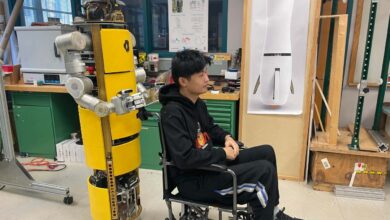Navigating the future of work: A case for a robot tax in the age of AI

In an era characterized by declining birthrates and the urgent need for enhanced productivity, the advent of artificial intelligence (AI) and robotics stands as a dual-edged sword, promising unprecedented efficiency while posing challenges to the economic and social structure through the potential displacement of human workers across both manual and professional fields. As we navigate this new technological revolution, the integration of automation into our workforce and economy moves to an imminent and practical concern.
At this pivotal moment, the proposal of a robot tax is introduced not merely as a knee-jerk governmental response to tax new and unknown technologies, but as a deliberate strategy aimed at enhancing the equity and fairness of technological advances. This approach seeks to sustain humanity and needed social services in this newly automated landscape, aiming to ensure the benefits of technological progress are broadly shared, thus facilitating a smoother, less disruptive transition for society and the economy. As the capabilities of AI continue to advance, the time is approaching to define the appropriate relationship between humans and AI/robots—a critical step towards harmonizing our coexistence.
Strategizing a robot tax: Economic buffers and ethical considerations
A robot tax, targeting companies that deploy AI and robotics that are capable of autonomous decision-making, fulfills two pivotal roles. Initially, it provides economic support for individuals affected by automation, bolstering unemployment benefits and ensuring the market’s demand for goods and services remains steady. Additionally, it prompts businesses to weigh the advantages of human labor against the efficiencies of automation, especially in cases where the benefits of either option are closely matched. This strategic decision-making is crucial for maintaining a dynamic market and healthy consumer demand, essential components of economic vitality.
For the robot tax to be implemented effectively, it’s imperative to clarify the legal relationship between humans and robots/AI. Assigning legal personality to robots would create a structured basis for taxation, responsibility, and ethical guidelines, reflecting discussions like those about autonomous vehicles. Like legal personality granted to corporations, it involves recognizing robots and AI systems as entities with a set of legal rights and obligations enabling them to enter contracts, potentially be held accountable for certain actions (to sue and to be sued), and become subject to taxation as separate entities. In essence, this implies recognizing that AI machines can create added value. Until now, economics has adhered to the labor theory of value, which sees only human labor as creating added value. Acknowledging that intelligent machines are also key players in value creation enables the imposition of taxes on the added value they generate. This legal framework is not about granting robots citizenship or human rights but establishing a structured basis for interactions between robots, individuals, and the state, particularly in contexts where autonomous decision-making by robots impacts the public domain.
The process of granting legal personality to robots would likely involve future legislative action to define the scope of rights and responsibilities associated with different categories of AI and robotics. For instance, a distinction could be made between simple automated machines and advanced AI systems capable of learning and making autonomous decisions. The limits of this legal personality would be carefully outlined to avoid attributing undue rights or moral considerations to robots. The focus would be on creating clear guidelines for how robots can be held responsible for their actions (liability), how they can be integrated into the existing tax systems (taxation), and how they can be controlled or governed by laws (regulation).
Then why the need for legal rights to tax robots when all kinds of equipment can be taxed without legal personality? This arises from the need for clarity and fairness in taxation policy. While it is true that equipment and property can be taxed without legal personhood, the unique nature of AI and robots—particularly their autonomous decision-making capabilities and the potential for generating income or performing tasks traditionally done by humans—presents new challenges for taxation frameworks. Assigning legal personality, in this context, helps to clarify the basis on which taxes are levied, ensuring that the economic benefits derived from the use of advanced AI and robotics are shared equitably within society. It’s not about giving robots rights akin to humans or animals but about adapting our legal and fiscal systems to the realities of an increasingly automated world. Such legal acknowledgment facilitates the tax’s logistical aspects and initiates a wider debate on the ethical considerations of relying on autonomous systems.
Recognizing the legal status of robots and AI transcends mere financial considerations, prompting a deeper exploration of the ethical dimensions involved in embedding autonomous systems into our daily existence. This step could facilitate the creation of regulations aimed at ensuring these technologies serve the public good while addressing any potential adverse effects or biases. Additionally, affording AI and robots legal personality simplifies issues of liability, similar to the discussions surrounding autonomous vehicles. Such recognition not only facilitates the implementation of a robot tax but also enriches the conversation about our evolving dependency on autonomous systems, compelling us to reconsider notions of agency, responsibility, and our interactions with these technological entities.
Key considerations for a robot tax
As we contemplate the future of a robot tax, several key considerations emerge. Firstly, the scope of taxation—identifying which industries and functions of AI to tax—is important. Secondly, the responsibility for the tax, whether it lies with the manufacturers or the employers of robots, requires clarification. Thirdly, given the global nature of technology and business, international cooperation is essential to prevent competitive disadvantages for countries adopting the tax. Lastly, we must establish an ethical baseline for the creation and employment of robots, contemplating the long-term possibility of AI developing or emulating consciousness and how this would redefine our relationship with them.
The determination of which industries and AI functions to tax involves a nuanced analysis to identify sectors where automation plays a critical role in productivity and employment dynamics. For instance, manufacturing, where robots have long been integral, and emerging fields like health care and finance, where AI’s impact is rapidly growing, are prime candidates. The goal is to develop a tax framework that acknowledges the varied contributions of AI and robotics across the economic spectrum, ensuring the tax is both fair and focused on areas with the most significant displacement potential.
Clarifying who bears the fiscal responsibility for the robot tax—manufacturers of the technology or the businesses that employ these automated systems—is essential. This decision influences the broader economic impact of the tax, potentially affecting innovation and investment in the sector. If manufacturers are taxed, it could slow down technological advancement by potentially increasing the development costs associated with such a tax. Conversely, taxing employers might lead to higher operational costs but encourage more thoughtful integration of automation. A balanced approach could involve considerations of the robot’s or AI system’s complexity, usage, and the economic context of its deployment.
Given the borderless nature of technology and commerce, international collaboration would be necessary in implementing a robot tax. Without a coordinated approach, countries adopting the tax might face economic disadvantages, such as loss of foreign investment or technology firms relocating to tax-friendly jurisdictions. Establishing international guidelines and agreements can help create a level playing field, ensuring that the robot tax supports global economic stability and fairness. This requires dialogue and partnership between nations, international bodies, and stakeholders in the tech industry. Effectively governing AI, including measures like taxation or establishing ethical standards, would likely necessitate some form of enforceable international agreement. Without widespread international cooperation, the impact of unilateral actions could be significantly diminished. This poses a challenge that needs to be addressed. As a country with considerable influence, the U.S. should take a leadership role in fostering and enforcing such agreements, ensuring that initiatives do not undermine its competitiveness or incentivize firms to relocate their robot operations abroad.
The development of robots and AI challenges us to consider not just the economic implications but also the ethical boundaries of our relationship with these technologies. Establishing an ethical baseline for the creation and employment of robots is essential, especially as we approach the frontier of AI potentially developing or emulating consciousness. This involves grappling with questions of rights, responsibilities, and the societal role of AI entities, ensuring that technological advancement aligns with human values and ethics. As we chart the course for a future intertwined with AI, these ethical considerations will shape not only tax policies but also the broader framework of human-machine coexistence.
The introduction of a robot tax emerges as a forward-thinking solution to the complex challenges brought about by automation and AI. This tax not only promises to redistribute the economic gains from technological progress by supporting workers displaced by automation, but it also plays a crucial role in enhancing societal equity. By reallocating wealth generated from the use of robots and AI, the robot tax aims to fund essential public services and initiatives—ranging from supporting elder care and social welfare to education and retraining—thereby addressing disparities and ensuring that the benefits of the AI revolution are shared across the entire spectrum of society. As we move forward, engaging in comprehensive discussions that span legal, ethical, and economic domains is crucial for developing policies that are both just and visionary. The trajectory of the future of work remains in our collective hands, offering us the opportunity to ensure that advancements in AI and robotics serve to uplift rather than undermine human welfare, making the case for a robot tax a pivotal step towards achieving a more equitable future for all.



